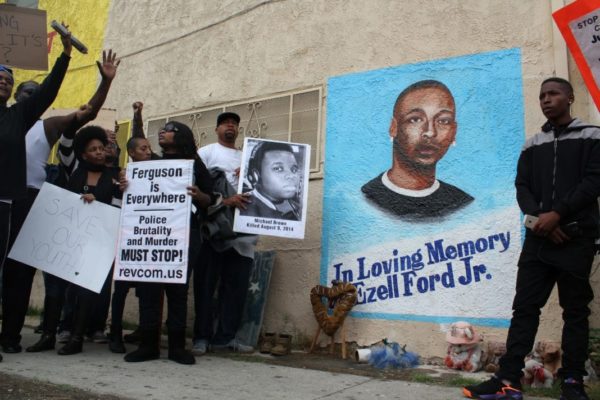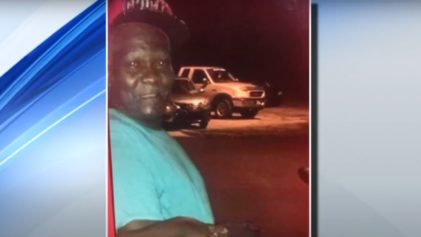
Photo by Daina Beth Solomon.
Los Angeles County prosecutors on Tuesday, Jan. 24, declined to file criminal charges against two Los Angeles police officers who shot and killed a mentally ill Black man near his home in August 2014.
Just two days after the fatal shooting of Michael Brown in Ferguson, Missouri, Ezell Ford, 25, was gunned down by Officers Sharlton Wampler and Antonio Villegas while walking home in South L.A. His death sparked widespread controversy during a time of already intense public scrutiny surrounding the manner in which police interact with those in predominately African-American and Latino communities.
Local activists called Ford’s death unjustified and argued that the district attorney’s decision was proof that LAPD officers are rarely held accountable for their actions, especially when it involves deadly use of force.
“The last bit of hope that we had is crushed,” Ford’s mother, Tritobia Ford, told reporters on Tuesday. “These officers are going scot-free. They are getting away with murder. There’s no justice for Ezell.”
L.A. County District Attorney Jackie Lacey’s decision not to prosecute Wampler and Villegas comes more than a year and a half after the Los Angeles Police Commission faulted one of the cops in Ford’s death, citing multiple flaws in his handling of the encounter that led to the shooting, according to the Los Angeles Times. In a lengthy 28-page report, however, Lacey explained that her decision stemmed from physical evidence that corroborated the officers’ assertions that Ford had knocked Wampler to the ground and attempted to grab his gun.
Prosecutors wrote that the Los Angeles man posed an “immediate threat” to the officers, and therefore, they were justified in responding with lethal force.
The police oversight committee ruled in June 2015 that Wampler and Villegas had no legal reason to stop Ford, who had been diagnosed with schizophrenia and bipolar disorder, The News & Observer reported. Authorities said Ford was leaving a “known gang area” near his home when officers yelled for him to stop, but he ignored their commands. Officer Wampler then approached the Los Angeles man, grabbing him by the shoulders because he believed Ford was trying to get rid of an illegal substance. That’s when authorities say Ford knocked the officer to the ground and wrestled for his holstered gun.
“This was not some officer who deliberately took out a gun and said, ‘I’m going to shoot Mr. Ford,'” Lacey said. “This was a struggle on the ground, for a couple of minutes, that was very tense.
“The question is did they honestly believe that Mr. Ford was about to take out the gun and shoot them, and there [are] a lot of facts that indicate that they did,” she continued.
Lacy also said that Ford’s DNA was found on Wampler’s holster and mentioned that one of the witnesses in the case told investigators they heard an officer yelling, “Let go of my gun!” Blood on the officer’s uniform, along with scuff marks on his utility belt were indications that Ford was on top of Wampler during their scuffle, according to prosecutors.
In 2015, the Los Angeles Police Commission found that Wampler had violated departmental policy when he fired at the Los Angeles man, The News & Observer reported. It also criticized the officer for approaching and physically apprehending Ford after his commands were ignored. The Los Angeles Times reported that Villegas, however, was cleared for his use of lethal force but still chewed out for drawing his gun so early in the altercation.
Still, Lacy declined to bring charges against the officers. Greg Smith, a lawyer representing the two cops, told reporters that disciplinary action hadn’t been taken as of Tuesday, but that the LAPD could still consider reprimanding Wampler and Villegas for their actions. If a disciplinary proceeding is initiated, however, the public would have no knowledge, as police discipline matters are kept confidential under California law, according to the Los Angeles Times.
Since the shooting, there has been no expectation for the Department of Justice to investigate Ford’s death or the LAPD, which has been the custom for other police departments involved in deadly shootings of civilians.
Ford’s family has since reached a tentative settlement in a state civil rights lawsuit they filed against the city, The News & Observer reported.


